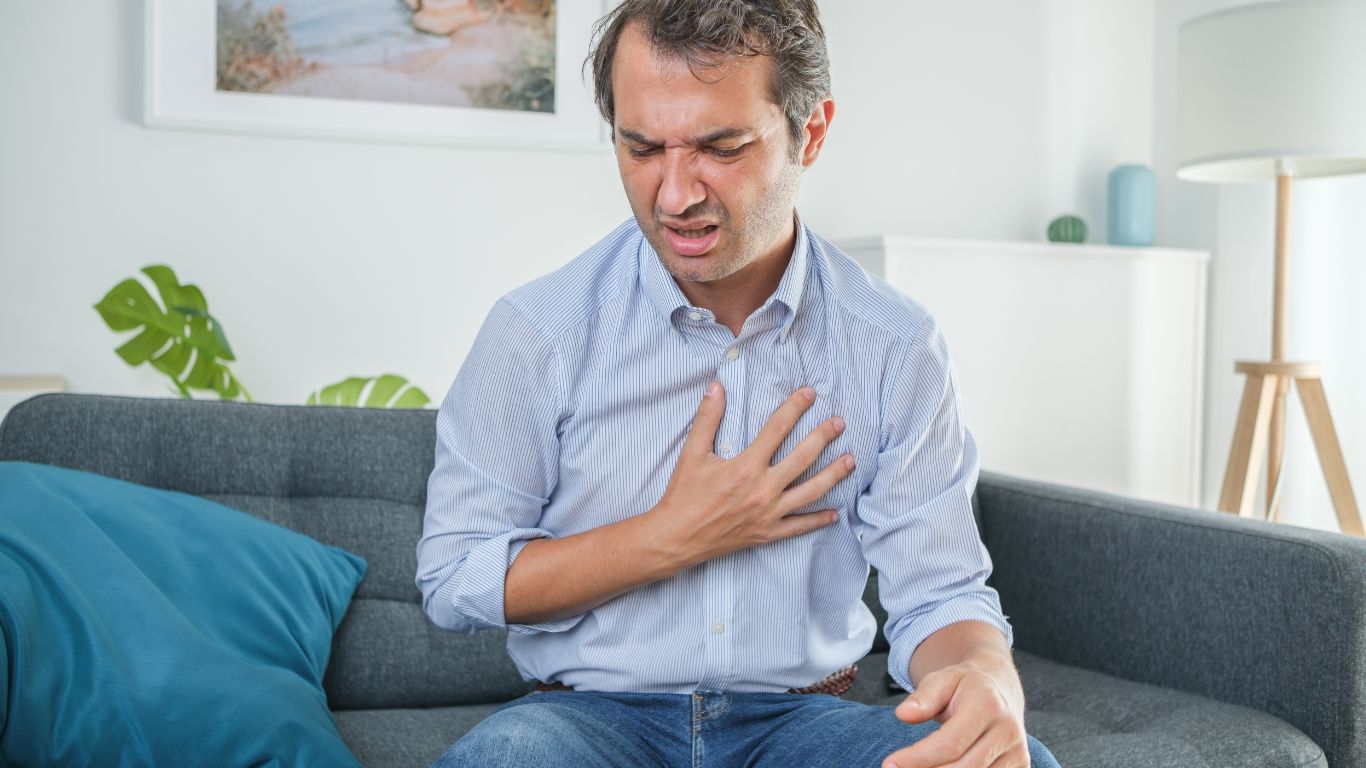Effective GERD and Chest Tightness Management for Long-Term Relief
GERD, or gastroesophageal reflux disease, is something I know all too well. As a GERD expert, I’ve seen firsthand how troubling the symptoms can be. One of the most common and concerning symptoms is chest tightness. The sensation of pressure or tightness in your chest can be downright frightening, often leading people to believe they’re having a heart attack. But it’s not always as serious as it seems. That’s why I’m here to help you understand the link between GERD and chest tightness, and more importantly, how to manage it effectively.
What is GERD and How Does it Relate to Chest Tightness?
Gastroesophageal reflux disease (GERD) occurs when the stomach acid or bile irritates the food pipe lining. This acid reflux can cause a variety of symptoms, from heartburn to regurgitation. One of the more alarming symptoms of GERD is chest tightness, which many people confuse with a heart attack. Trust me, I’ve worked with plenty of patients who were convinced their chest pain was related to their heart rather than their digestive system. But the reality is that GERD-induced chest tightness is quite common and treatable.
Understanding Chest Tightness: Is it GERD or Something Else?
When it comes to chest tightness, it’s crucial to differentiate between a heart issue and something like GERD. GERD-related chest tightness typically feels like a pressure or discomfort, rather than the sharp pain often associated with a heart attack. The tightness is usually caused by acid backing up into the esophagus, irritating the lining of your chest and throat.
But how can you be sure it’s GERD and not a heart problem? Well, if you’ve had a previous diagnosis of GERD, are prone to acid reflux, or notice that the tightness comes after eating or when lying down, then it’s likely a GERD-related issue. However, any chest pain should be taken seriously, so it’s important to seek medical advice if you’re unsure or if the pain doesn’t resolve quickly.

Symptoms of GERD That Could Trigger Chest Tightness
Understanding the symptoms of GERD is key to managing your chest tightness. GERD is more than just occasional heartburn. It can lead to a series of uncomfortable and sometimes painful symptoms that affect your day-to-day life. Knowing what to look for can help you manage GERD before it gets worse. Here’s a list of common symptoms that could lead to chest tightness:
- Heartburn: A burning sensation in the chest, especially after meals or when lying down.
- Regurgitation: The feeling of stomach acid or food coming back up into your throat or mouth.
- Dysphagia: Difficulty swallowing, which may cause a feeling of tightness or discomfort in the chest.
- Chronic cough or sore throat: This can sometimes occur with GERD, as the acid irritates your throat.
- Chest Pain or Tightness: Often linked to GERD, this can occur due to acid reflux irritating the esophagus.
If you experience any of these symptoms regularly, it’s important to pay attention and consider how they might be affecting your chest tightness. As a GERD expert, I always recommend tracking your symptoms. Keeping a log of when you experience chest tightness and its severity can provide valuable information to your doctor when determining the best treatment plan.
How to Manage GERD and Chest Tightness Effectively
Managing GERD and the associated chest tightness doesn’t have to be complicated. With a few lifestyle changes and medical treatments, you can keep your symptoms in check. Let’s explore some ways you can manage both GERD and chest tightness:
1. Modify Your Diet
Your diet plays a major role in triggering GERD symptoms. Certain foods can relax the lower esophageal sphincter (LES), the muscle that keeps acid in the stomach. When the LES relaxes, stomach acid can flow into the esophagus, leading to chest tightness. Avoiding common GERD trigger foods like:
- Spicy foods
- Tomato-based products
- Citrus fruits
- Chocolate
- Caffeine
- Fried and fatty foods
Additionally, it’s important to eat smaller meals and avoid eating late at night, as this can help reduce the risk of acid reflux. Try not to lie down for at least three hours after eating, as this gives your body time to digest and prevents acid from flowing up into your esophagus.

2. Lose Weight if Needed
If you’re overweight, it could be contributing to your GERD symptoms. Excess weight puts additional pressure on your stomach, which can cause acid reflux. Losing weight through a healthy diet and exercise regimen can help reduce this pressure and alleviate chest tightness associated with GERD. I always recommend working with a healthcare provider to set realistic goals and a sustainable plan that fits your lifestyle.
3. Avoid Tight Clothing
Believe it or not, the clothes you wear can affect your GERD symptoms. Tight clothing, especially around the waist, can put pressure on your stomach and increase the likelihood of acid reflux. Opt for loose-fitting clothes to reduce this pressure and decrease the risk of triggering chest tightness.
4. Medication Options for GERD Management
If lifestyle changes alone aren’t enough to manage GERD and chest tightness, there are medications that can help. Some of the most common options include:
- Antacids: Over-the-counter antacids like Tums or Maalox can provide quick relief by neutralizing stomach acid.
- H2 Blockers: These medications reduce acid production, providing longer-lasting relief.
- Proton Pump Inhibitors (PPIs): Stronger medications that block acid production and promote healing of the esophagus.
Be sure to talk to your doctor about the right medication for your symptoms. They can help guide you toward the best treatment based on your specific needs and health profile.

When Should You See a Doctor About GERD and Chest Tightness?
While managing GERD at home is possible for many people, there are times when it’s crucial to see a doctor. As someone who has worked in digestive health for years, I’ve seen how easy it can be to brush off GERD symptoms—especially when chest tightness feels like something we can just power through. But here’s the thing: when chest tightness becomes frequent, severe, or unmanageable, it’s time to seek professional help.
Don’t Ignore Persistent Symptoms
I’ve had patients tell me, “It’s just my GERD acting up again,” but sometimes, chest tightness can be a sign of something more serious. If your chest tightness is accompanied by shortness of breath, dizziness, or pain radiating down your arm, don’t wait for it to get better on its own. It’s essential to rule out heart problems, and a healthcare professional can guide you through the right tests and treatments.
Even if your chest tightness is likely caused by GERD, seeing a doctor can help you take a more proactive approach. Your doctor can assess the severity of your condition, adjust your treatment plan, and recommend lifestyle changes that could significantly improve your symptoms.
How to Prevent GERD and Chest Tightness in the Future
Prevention is always better than a cure, right? Especially when it comes to GERD and chest tightness. Managing GERD is a long-term commitment, and that means making smart choices daily. I’ve worked with patients who successfully reduced their symptoms by sticking to a prevention plan, and I can tell you that small changes can make a huge difference. Let’s go through some of the most effective strategies to keep GERD—and that pesky chest tightness—under control.
1. Maintain a Healthy Weight
If you haven’t already, losing excess weight can make a world of difference for your GERD symptoms. I’ve seen patients drop just a few pounds and notice immediate relief from chest tightness. Extra weight, especially around the abdomen, puts pressure on your stomach, forcing acid up into your esophagus. Maintaining a healthy weight reduces this pressure, which helps prevent the acid reflux that causes chest tightness.
For most people, a balanced diet combined with regular physical activity can be enough to achieve and maintain a healthy weight. It’s important to focus on long-term changes rather than quick fixes or fad diets. When it comes to weight loss, consistency is key!

2. Elevate Your Head While Sleeping
As someone who has dealt with GERD firsthand, I can tell you that sleeping can be a challenge. One of the best tips I give my patients is to elevate the head of your bed while sleeping. By raising the head of your bed by about 6–8 inches, gravity helps keep stomach acid from flowing back into your esophagus. It’s a simple adjustment, but it works wonders in preventing GERD symptoms, including chest tightness, at night.
If you don’t have an adjustable bed, you can use wedges or pillows to prop yourself up. However, make sure that the elevation is enough to keep acid reflux from occurring. I’ve found that many people overlook this simple step, but it can make a noticeable difference in your quality of sleep and your GERD symptoms.
3. Manage Stress Effectively
Stress is one of those things we can’t completely eliminate from our lives. But let’s be honest—stress and GERD don’t mix well. Stress has been known to increase stomach acid production and relax the LES, which leads to more acid reflux. I’ve had patients tell me that their GERD symptoms flare up more during stressful periods, and they’re not wrong. That tightness in the chest can feel even more intense when you’re stressed out!
Finding healthy ways to manage stress can make a huge difference in how your body responds to GERD triggers. Whether it’s meditation, yoga, exercise, or simply taking time to relax, find what works for you. A stress management routine can help reduce the frequency and severity of GERD symptoms, including chest tightness.
4. Take Your Medication as Directed
If your doctor has prescribed medication for your GERD, it’s essential to take it exactly as directed. I often work with patients who stop their medication because they feel better, only for their symptoms to return with a vengeance. That’s why sticking to your prescribed regimen is critical. Sometimes, the medications I recommend—like proton pump inhibitors (PPIs) or H2 blockers—take time to work, and consistency is key to getting the full benefit.
If you’re unsure whether your medication is working or if it’s causing side effects, talk to your doctor. There are different treatment options, and your doctor may adjust your dosage or try a different medication to better manage your symptoms and chest tightness.
Can GERD Be Cured?
This is a question I get often from patients, and while it’s great to have hope for a permanent cure, the reality is that GERD is typically a chronic condition. That said, it doesn’t mean you’re stuck with the symptoms forever. With proper management, you can live a healthy, active life without the burden of constant acid reflux and chest tightness.
In my experience, people who focus on long-term lifestyle changes—like managing their diet, maintaining a healthy weight, and reducing stress—experience significant relief. And while there may not be a “cure” for GERD, it is definitely manageable, and the symptoms can be kept under control. It’s all about finding the right balance of treatments and lifestyle modifications that work for you.

Case Studies & Real-Life Examples
Throughout my career as a GERD expert, I’ve had the privilege of working with many patients who’ve struggled with chest tightness. Each person’s experience with GERD is unique, but there are common themes I’ve seen over and over again. Let me share a few real-life examples to help you understand how GERD and chest tightness can affect different people, and how they managed to take control of their condition.
Case Study 1: Sarah’s Story – Managing GERD with Diet and Medication
Sarah, a 32-year-old marketing professional, came to me after months of dealing with frequent chest tightness. She initially thought it was related to stress or perhaps even a heart condition, as her symptoms were so intense. After ruling out cardiac issues, we focused on Sarah’s lifestyle, specifically her diet. She was often eating spicy, fried foods on the go, which we identified as major GERD triggers. By making simple dietary adjustments—cutting back on the trigger foods, eating smaller meals, and avoiding late-night snacks—Sarah noticed an immediate improvement.
In addition to dietary changes, we put her on a PPI (proton pump inhibitor) for a short time to help manage the acidity. Within weeks, Sarah was able to say goodbye to the persistent chest tightness. Her energy levels were up, and she was feeling like herself again. Sarah’s success story is a perfect example of how a combination of lifestyle changes and the right medication can effectively manage GERD symptoms.
Case Study 2: Mike’s Story – Managing GERD with Weight Loss
Mike, a 45-year-old father of two, had struggled with GERD for years. His chest tightness was a constant issue, especially after meals. He was overweight and had a sedentary job, which contributed to increased abdominal pressure and more acid reflux. After working with me to develop a weight loss plan tailored to his needs, Mike slowly shed some pounds over several months. He also incorporated regular exercise, focusing on low-impact activities like walking and swimming.
Over time, Mike noticed that his chest tightness became less frequent. He was no longer reaching for antacids after every meal, and his GERD symptoms were under better control. His weight loss journey wasn’t easy, but it made a huge difference in his GERD management. Mike’s story is a testament to how addressing the root cause—like excess weight—can lead to significant improvements in GERD symptoms and overall well-being.

Key Takeaways: What You Need to Remember
So, what’s the most important thing to remember when it comes to managing GERD and chest tightness? Here’s a quick summary of the key points:
- GERD and chest tightness are often linked: Chest tightness caused by GERD is a common symptom, but it’s essential to rule out other conditions, like heart disease, especially if the chest tightness is severe or accompanied by other concerning symptoms.
- Lifestyle changes are critical: Small adjustments to your diet, exercise routine, and stress management can make a big difference in reducing GERD symptoms, including chest tightness.
- Medication can help: If lifestyle changes alone aren’t enough, medications like PPIs and H2 blockers can provide relief by reducing stomach acid.
- Seek medical help when necessary: If chest tightness or other GERD symptoms become severe, persistent, or unmanageable, don’t hesitate to consult with a healthcare professional.
Remember, GERD is a chronic condition, but with the right strategies, you can manage your symptoms and live a healthy, active life without the fear of chest tightness taking over your day.
FAQs
1. Can GERD cause chest tightness every day?
Yes, for some people, GERD can cause daily symptoms, including chest tightness. If this is the case, it’s important to take steps to manage the condition, including medication, dietary changes, and lifestyle modifications. If symptoms persist, be sure to consult with a healthcare provider for further evaluation.
Common trigger foods include spicy dishes, fried foods, citrus fruits, chocolate, caffeine, and mint. By avoiding these foods, you can reduce the risk of GERD flare-ups and the associated chest tightness.
3. Can weight loss help alleviate GERD symptoms?
Absolutely! For many people, losing excess weight can significantly reduce GERD symptoms, including chest tightness. Weight loss helps reduce pressure on the stomach, which in turn can minimize acid reflux and the discomfort that comes with it.
4. Are there any natural remedies for GERD chest tightness?
Some people find relief from GERD symptoms with natural remedies like ginger tea, chamomile, or aloe vera juice. While these remedies may provide temporary relief, they should be used in combination with a comprehensive GERD management plan. Always consult with a healthcare provider before trying new remedies.
Bonus: Additional Resources or DIY Tips
If you’re looking for additional tips to manage GERD, here are a few DIY remedies and lifestyle practices to try:
- Eat smaller meals more frequently: Rather than large meals, try eating smaller portions throughout the day to prevent excess stomach acid production.
- Stay hydrated: Drinking plenty of water throughout the day helps neutralize stomach acid and can reduce the risk of acid reflux.
- Practice mindful eating: Slow down and chew your food thoroughly. This can help reduce the likelihood of reflux and improve digestion.
Appendix: Table, References, Disclaimer, and Call to Action
Here’s a quick reference table to guide you through GERD management:
| GERD Trigger | Recommended Action |
|---|---|
| Spicy Foods | Avoid or reduce intake |
| Heavy Meals | Eat smaller, more frequent meals |
| Late-Night Snacking | Avoid eating at least 3 hours before bed |
Disclaimer: This article is intended for informational purposes only and should not be used as a substitute for professional medical advice. Always consult with a healthcare provider for a personalized treatment plan.
Call to Action: If you’re struggling with GERD and chest tightness, don’t wait to seek help. Reach out to a healthcare provider, and start taking control of your digestive health today. With the right strategies and support, you can manage GERD effectively and live your best life!

Camellia Wulansari is a dedicated Medical Assistant at a local clinic and a passionate health writer at Healthusias.com. With years of hands-on experience in patient care and a deep interest in preventive medicine, she bridges the gap between clinical knowledge and accessible health information. Camellia specializes in writing about digestive health, chronic conditions like GERD and hypertension, respiratory issues, and autoimmune diseases, aiming to empower readers with practical, easy-to-understand insights. When she’s not assisting patients or writing, you’ll find her enjoying quiet mornings with coffee and a medical journal in hand—or jamming to her favorite metal band, Lamb of God.







